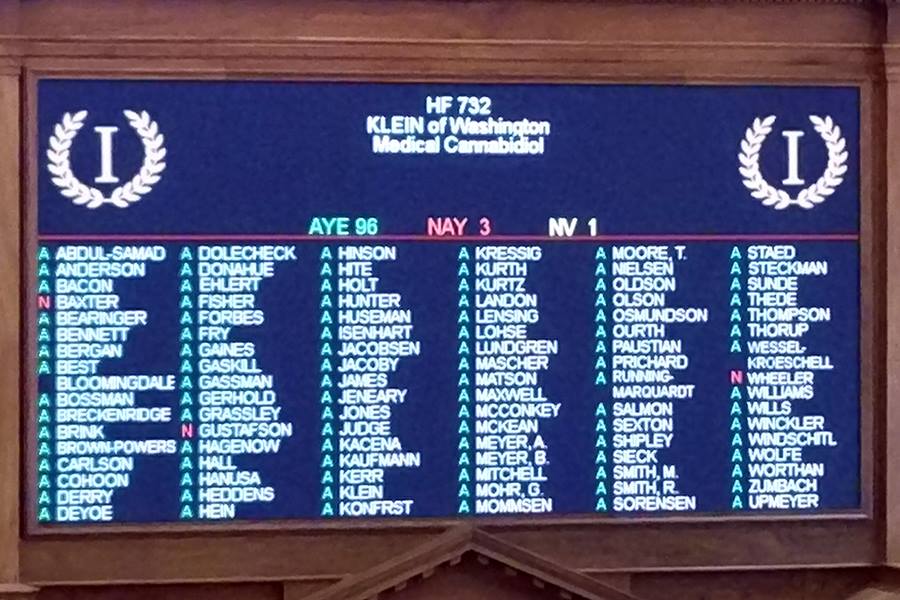Carl Olsen is a leading advocate for expanding access to medical cannabis in Iowa and maintains the Iowans for Medical Marijuana website. -promoted by Laura Belin
The Des Moines Register reported on March 29 that a member of the Iowa Medical Cannibidiol Advisory Board had resigned over comments made on the floor of the House during debate on House File 732. (Bleeding Heartland covered that bill’s passage here.)
Iowa House members who voted this week to allow the sale of stronger medical marijuana products said they were following the advice of physicians on a state board — even though that board voted unanimously last fall not to recommend the change.
The House’s action prompted the resignation this week of a physician who serves on the Iowa Medical Cannabidiol Advisory Board.
Des Moines neurologist Wendy Zadeh was among eight board members who voted in November 2018 to maintain the state’s 3% cap on THC, the chemical that can make marijuana users high.
The Des Moines Register article incorrectly implied that HF 732 was drafted solely from the input of the advisory board.
Video of the debate reveals that the advisory committee and “others” were involved in drafting the legislation. State Representative Jarad Klein, the bill’s floor manager, said the bill grew out of work with members of the board “and both parties,” not solely from board. His. (Editor’s note from Laura Belin: I pulled Klein’s final remarks on the bill and am enclosing that clip here. You can watch the whole debate on the Iowa legislative website; the relevant speech by Klein begins around the 4:55:00 mark.)
In another example of inaccurate reporting, WHO-TV reported on March 5 that Senate File 256 would remove the THC limit that producers can put in each dose of medical cannabidiol. But SF 256 did not remove the 3 percent cap on THC. The House Public Safety Committee introduced House Study Bill 244 (now numbered HF 732) on March 6 and voted the bill out of subcommittee the same morning. The House bill actually does remove the 3 percent cap on THC.
Speaking on the House floor on March 26, Klein said the legislature had worked with the Medical Cannabidiol Advisory Board and others. He never claimed the advisory board had recommended removing the THC cap. While the advisory board did not recommend lifting the cap, it’s hard to imagine the board’s role is to object to such a proposal by lawmakers. The board’s duties are clearly defined in Iowa Code 124E.5(6), the 2017 statute that established the current medical cannabis program:
The medical cannabidiol board may recommend a statutory revision to the definition of medical cannabidiol contained in this chapter that increases the tetrahydrocannabinol level to more than three percent, however, any such recommendation shall be submitted to the general assembly during the regular session of the general assembly following such submission. The general assembly shall have the sole authority to revise the definition of medical cannabidiol for purposes of this chapter.
The advisory board has no authority to recommend lowering the THC limit or to recommend leaving it at 3 percent. It can only recommend increasing the THC limit. In addition, lawmakers may propose something the advisory board did not recommend. Dr. Zadeh, the board member who resigned, was mistaken to imply Klein attributed that recommendation to the board.
Moreover, the board’s reason for not recommending an increase wasn’t strong. According to the Des Moines Register, board member Lonny Miller, a family physician from Creston, said at the time, “I’d like to get another year or two under our belts and see how people respond with the current THC cap.”
Here is time line that fills in some (but not all) of the missing details.
December 18, 2018:
Activities of the Medical Cannabidiol Board Report – the board recommended, among other things:
Leaving the THC cap on medical cannabidiol products manufactured in Iowa at 3 percent in Iowa Code §124E.5(6).
Removing felony disqualifiers for patients and primary caregivers in Iowa Code §124E.4(1)(f) and Iowa Code §124E.4(3)(c).
Adding physician assistant or advanced registered nurse practitioner to the definition of health care practitioner in Iowa Code §124E.2(5).
February 12, 2019:
State Senator Brad Zaun introduced SF 256.
Among other things, Senator Zaun’s bill:
Left the THC cap at 3 percent.
Removed felony disqualifiers.
Added physician assistant and advanced registered nurse practitioner to the definition of health care practitioner.
February 18, 2019:
SF 256 passed out of subcommittee at 3:30 p.m. on February 18.
February 18, 2019:
House Speaker Linda Upmeyer, the top Republican in the House, has said lawmakers should wait for recommendations from a state board appointed to oversee Iowa’s medical marijuana program, so these expansion plans being discussed in the Senate face an uncertain future.
February 23, 2019:
The Des Moines Register reported that 78 percent of Iowans want the medical marijuana program expanded.
House Speaker Linda Upmeyer’s spokesman said recently that she continues to doubt the need for legislators to loosen restrictions on which Iowans can purchase the medications. She would prefer that any such moves come from a board of physicians that was appointed last year to consider proposals.
February 26, 2019:
The Cedar Rapids Gazette reported,
“There are things that can be done, things we will do, that make it a little easier, a little safer and give the board a little more latitude,” House Speaker Linda Upmeyer, R-Clear Lake, said Tuesday after meeting with members of the Medical Cannabidiol Board.
March 5, 2019:
Senate File 501 passed out of committee (formerly SF 256 – with an amendment on exemption from federal regulation added that same day by a vote of 14-1)
March 5, 2019:
WHO-TV reported (incorrectly),
The bill would remove the limit of THC that producers can put in each dose, allow for more dispensaries in the state, and mandate Iowa’s Medical Cannabidiol Board to include PTSD on the list of qualifying conditions.
March 6, 2019:
HSB 244 introduced by Committee on Public Safety Chair Jarad Klein. Oddly, Klein’s bill does remove the limit on THC, a provision WHO TV had inaccurately said was in the Senate bill.
March 6, 2019:
HSB 244 passed out of subcommittee at 9:30 a.m. on the same day it was introduced.
March 7, 2019:
HF 732 passed out of committee (formerly HSB 244) by a vote of 21-0.
March 26, 2019:
HF 732 passed in the House by a vote of 96-3.
Klein’s bill recommended removing the limit on THC, which the advisory board did not recommend. But he said the advisory board and “others” were included in preparation of the legislative proposal. The advisory board was never given authority to write legislation.
A good analogy would be the recommendation of the pharmacy board in 2010 to remove marijuana from state schedule 1, which the legislature still hasn’t done. Chapter 124E authorizes the advisory board to recommend increasing the THC limit, but not to recommend lowering it or even keeping it at 3 percent.
Until February 26, Upmeyer had been saying there would be no changes to the medical cannabis program this year, which did not leave Klein much time to run a bill a week before the legislature’s first “funnel” deadline on March 8.
The Senate started working on Zaun’s bill earlier, which gave people more time to participate.
Klein deserves an award for work extremely well done in a short amount of time and under tremendous pressure.
HF 732 has been referred to the Senate Judiciary Committee, where a subcommittee was scheduled to consider it today. To make it through the legislature’s second “funnel,” non-appropriations bills must be approved by one chamber and at least one committee in the other chamber by April 5. UPDATE: The Senate subcommittee advanced the bill without amendments on April 1.
Top photo of the state capitol and picture of the Iowa House vote on March 26 by Carl Olsen, both used with permission.



2 Comments
After watching Klein's speech again
I can see why Dr. Zadeh felt the board’s perspective had been somewhat misrepresented. While Representative Klein did not directly state that the board recommended what the bill did, he indicated that lawmakers relied on the board because most of them lack medical expertise. Listeners could get the impression the board was at least ok with the bill’s provisions.
You are absolutely right that the state legislature doesn’t need to (and frequently doesn’t) limit itself to changes recommended by state boards.
Laura Belin Mon 1 Apr 12:07 PM
Listen better
I think Rep. Klein adequately described the input that was received as a mixture of advice from the board and from both parties (others). The advisory board member acted inappropriately. The 3% cap on THC came from the legislature, not from the advisory board. The removal of the 3% cap is a decision for the legislature, not an advisory board.
carl Mon 1 Apr 3:53 PM